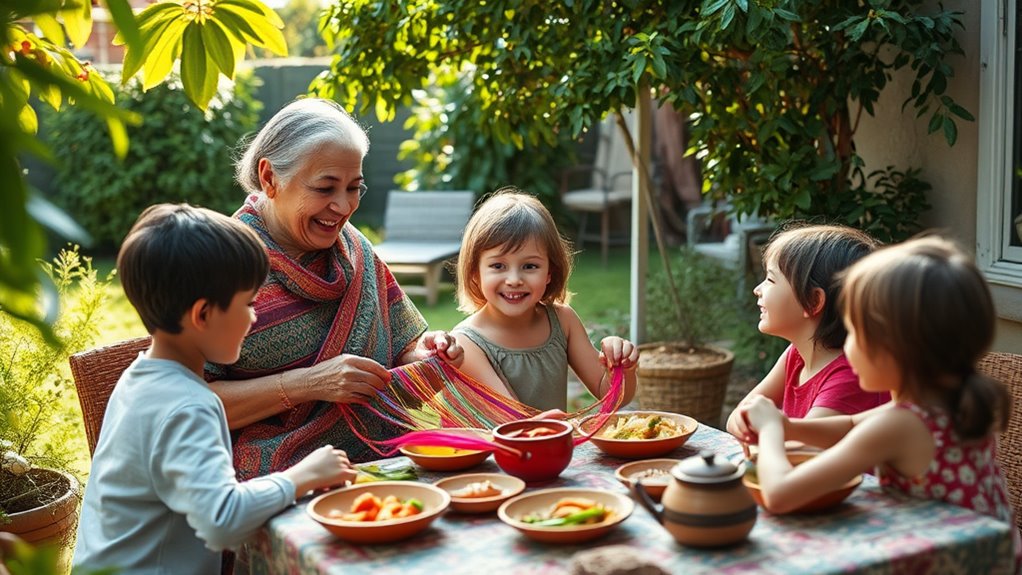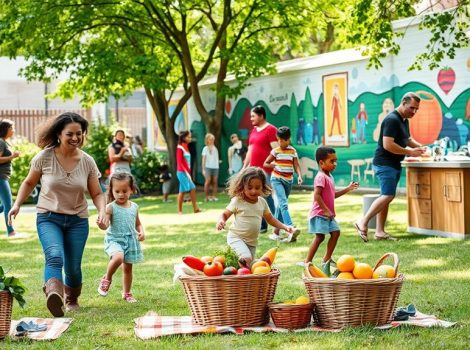How to Incorporate Cultural Heritage Into Family Traditions
Incorporating cultural heritage into your family traditions can enrich your family’s identity and strengthen bonds. You might start by sharing stories that resonate with your ancestry, or perhaps gather in the kitchen to cook recipes passed down through generations. Think about how celebrating cultural festivals or integrating traditional music could transform your family gatherings. Each of these practices opens a door to deeper connections, yet there’s more to explore about crafting rituals that truly reflect your heritage. What unique traditions could you create that honor your past while shaping your family’s future?
Understanding Cultural Heritage
Cultural heritage is the tapestry of traditions, languages, and customs passed down through generations. It’s like a treasure chest filled with stories, food, and rituals that shape who you’re and where you come from.
When you think about your family history, you might picture grandma making her famous pie or your parents celebrating a special holiday in a unique way. These traditions are more than just fun; they connect you to your roots and help you understand your identity.
Understanding cultural heritage means recognizing the significance of these shared experiences. It’s about knowing the songs your ancestors sang, the festivals they celebrated, and the values they held dear.
You might find that some of these customs are quirky or funny, like that time your uncle danced at a family gathering and nearly knocked over a lamp. Embracing your cultural heritage gives you a sense of belonging and pride.
As you explore these traditions, you’ll see that they can be a wonderful way to bond with family. So go ahead, plunge into your family’s history, and celebrate the unique tapestry that makes you, well, you!
Storytelling as a Tradition
Storytelling has long been a cherished way to pass down cultural heritage, weaving together the experiences and lessons of previous generations.
It’s like a magical thread that connects you to your ancestors. When you share stories, you’re not just passing time; you’re sharing pieces of who you are.
Gather your family together, maybe around a cozy fire or during a rainy afternoon, and invite everyone to share their favorite tales.
You could tell funny stories about your childhood, share legends from your culture, or recount family adventures.
Don’t worry if you’re not a professional storyteller—it’s all about having fun!
Encourage your family members to add their own twists to the stories.
Maybe your grandpa’s fishing tale turns into a wild adventure involving a giant fish and a pirate ship!
Family Recipes and Culinary Practices
Food is often at the heart of family gatherings, with cherished recipes passed down through generations. These family recipes aren’t just meals; they carry stories, traditions, and a taste of your culture. When you cook Grandma’s famous lasagna or Mom’s spicy curry, you’re not just following a recipe—you’re connecting to your roots.
So, why not make it a family affair? Gather everyone around the kitchen, and let each person take part in the cooking. You might discover Aunt Sue has a secret ingredient that makes her pie special, or maybe your little brother can finally master the art of flipping pancakes without making a mess!
Sharing these culinary practices not only brings you together but also helps everyone learn about their heritage. You can even create a family recipe book. Ask each family member for their favorite dish and write down the stories behind them.
It’ll be a fun project, and in the end, you’ll have a treasure trove of flavors and memories to enjoy for years to come. Plus, who wouldn’t want a reason to eat more delicious food?
Celebrating Cultural Festivals
Family gatherings don’t just revolve around meals; they also embrace the vibrant celebrations of cultural festivals that bring everyone together. These festivals are a fantastic way to connect with your heritage and create lasting memories.
Imagine the joy in sharing stories about the significance of each festival while everyone is dressed in colorful attire, celebrating traditions that have been passed down through generations.
You can start by researching local cultural festivals in your area. Attend them as a family and immerse yourselves in the dances, music, and foods that define your heritage.
If you can’t find any nearby, consider creating your own mini-festival at home! You could decorate your space with items that represent your culture, cook traditional dishes, and even play music that resonates with your family’s roots.
Don’t forget to invite friends and neighbors! Sharing these experiences can deepen bonds and promote understanding. Plus, who doesn’t love a good party with delicious food?
Crafting Unique Rituals
Creating unique rituals can breathe new life into your family traditions and strengthen your connection to cultural heritage. Think about what makes your culture special. Is it a particular food, a story, or a traditional game? You can take these elements and turn them into fun rituals.
For example, if your family loves a specific dish, why not have a cooking night where everyone helps prepare it, sharing stories about its significance?
You could also create a storytelling night, where each family member shares a favorite tale from your culture. This can spark laughter and teach everyone about your roots.
Or, if you have a special game, make it a family tournament with prizes—bragging rights can be a fantastic motivator!
The key is to make these rituals personal and engaging. Don’t stress about perfection; focus on having fun and creating memories together.
If things go a little off-script, just laugh it off! These unique rituals not only honor your heritage but also create bonds that last a lifetime.
Integrating Language and Music
Integrating language and music into your family traditions can enrich your connection to cultural heritage in meaningful ways. Think about learning a few key phrases in a language your family speaks. You could start with greetings or simple expressions like “thank you” or “I love you.” It’s a fun way to share your roots and connect with each other. Plus, it might even impress your friends!
Now, let’s talk about music. Playing traditional songs during family gatherings can really set the mood. You could even have a little dance party! Encourage everyone to join in, whether they’re good dancers or just wiggle their way through. It doesn’t matter if you’re off-beat; it’s all about having fun together.
You might also consider creating a family playlist featuring songs from your cultural background. This playlist could be a great way to celebrate your heritage during special occasions or even just on a lazy Sunday afternoon.
Documenting Family History
Documenting family history is a powerful way to connect with your cultural roots and preserve your legacy for future generations. You can start by gathering stories from your family members. Ask your grandparents about their childhoods or your parents about their favorite family traditions. You’d be surprised at the tales that come out!
Next, consider creating a family tree. It’s like a treasure map of your ancestry. You can draw it out on paper or use online tools that make it super easy. Don’t forget to include fun facts about each person—like who’d the best dance moves at weddings or the most unusual pet!
You might also want to take lots of family photos. Snap pictures during gatherings, holidays, or just everyday moments. These visuals can really bring your family history to life.
Finally, write down your findings in a scrapbook or a digital format. Share it with your family, and who knows? You might inspire the next generation to keep the tradition going. Plus, it’s a great excuse for some quality family time—everyone loves a good story, right?




